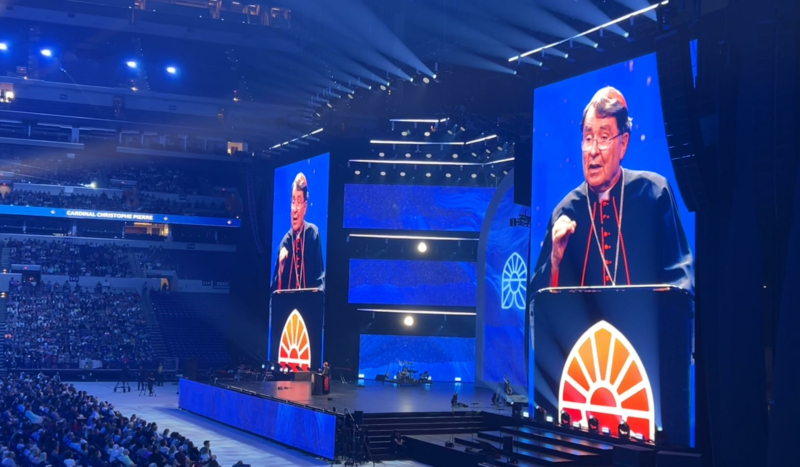
CV NEWS FEED // Pope Francis’ personal representative to the United States attended the opening event of the 10th annual National Eucharistic Congress this week, where he spoke about the Eucharist’s capacity to bring unity and healing.
“Praise be Jesus Christ,” began apostolic nuncio Cardinal Christophe Pierre from the main stage in the Lucas Oil Stadium on July 17.
The thousands attending the Congress responded: “Now and forever.”
Cardinal Pierre expressed his joy of being at the Congress and explained that, as the Pope’s representative, “My being here is a way to express the Pope’s spiritual closeness to you, and this unity with you, and with this country.”
“What a gift this is that we can be united as a Church through our Holy Father,” he said, adding, “at the same time, what brings us together at this Congress, the Holy Eucharist, is also an immense gift for unity.”
His address, the first speech given at the Congress, immediately followed the opening prayers, adoration, and procession. At the beginning of the opening event, the perpetual pilgrims from the four routes of the National Eucharistic Pilgrimage entered the stadium, marking the conclusion of the multi-month Pilgrimage and the convergence of the four routes.
Immediately after, Bishop Andrew Cozzens of the Diocese of Crookston, Minnesota, led a Eucharistic procession into the stadium and placed Jesus in the monstrance on the center altar. The thousands of persons in attendance then worshiped Jesus in adoration and Bishop Cozzens led prayer.
Reflecting on prayer at the Congress, Cardinal Pierre said in his address, “Perhaps our main prayer for this Eucharistic Congress should be this: that we, as a Church, may grow in our unity, so that we become more fruitful in our mission.”
The apostolic nuncio recalled that Jesus prayed on the night of when He instituted the Eucharist at the Last Supper “That they may all be one.”
Cardinal Pierre also reflected on the questions “What is Eucharistic Revival?” and “How will we know we are experiencing Eucharistic Revival?”
At the diocesan and parish level, he said, opportunities for both adoration and Eucharistic processions have increased, and now they have reached the national level as well.
However, he continued, “We know that such Revival, while it is always accompanied by sacramental devotion, must extend beyond devotional practices as well. When we are truly revived by the Eucharist, then our encounter with Christ’s real presence in the sacrament opens us to an encounter with Him in the rest of our life: this means seeing Him everywhere we go. It means meeting Him in the interactions we have with others.”
Jesus is present in one’s friends and family, but He is also present in encounters with those whom “we would otherwise consider ourselves divided” from, Cardinal Pierre said.
“This might include people from a different economic class, or race, people who challenge our way of thinking, people whose perspective is informed by experiences that differ greatly from our own,” he continued, highlighting that Christ is the bridge for those who are divided.
God alone has the power to give meaning to suffering, to heal divisions, and bring unity, he later emphasized, adding: “God’s power comes to us in the Eucharist.”
He also encouraged listening to the voice of the Holy Spirit and invited those attending adoration “to let the Lord reveal to you any places of resistance.”
“Often, we resist the work of Christ when we are afraid to let go of our own understanding and control, afraid to allow His wisdom and power to lead,” he said, later concluding:
God loves us, and He leads us by love; not to manipulate us, not to achieve some agenda. He is the only One Who can lead us to new life. By following Him, we can become true apostles of His Kingdom.

